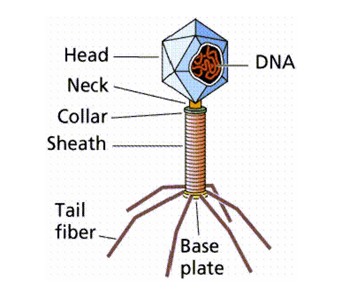We have been fighting against bacteria through antibiotics, but bacterial resistance is an increasing concerning issue. For this reason, new lines of investigation are focusing in something that was discovered during the 20th century: bacteriophages (also called phages). Its name tells us everything: they eat bacterias (literally).
How is the study going to be?
The first step is isolating natural phages from different environments. Then examine their activity against the main pathogen bacterias and finally test them as antibacterial agents in experimental animals.
However, some of the new studies are not based on complete phages, but by isolating some of their proteic components such as Tailokines and Lisines that are involved in fixation and breaking the bacterial cell wall, respectively. Both of them have lethal effects on the host and can be genetically manipulated to attack different bacterial varieties.
Which bacterial families have been selected as targets?
As mentioned before, those in which there's an increasing developing resistance against antibiotics. Some of them are:
- Pseudomonas aeruginosa: responsible for severe lung and kidney infections. They are highly resistant to antibiotics
- Staphylococcus aureus: commonly causes skin and respiratory infections. It's also the responsible for some intoxications. The increasing resistance to Vancomycin, gives us no more antibiotic options to those people suffering from VRSA
- Clostridium difficile: causes a colitis type that's frequently resistant to antibiotics
Has this ever been studied before?
Yes. Some drugs have achieved clinical trials phase I (to determine if they are tolerated by the body) and phase II (to establish their efficacy in a small scale)
Which has been the more successful study?
It's known as PHAGOBURN and it's focused on the treatment of infections related with burns. It started in 2013 and is funded by the European Commission. In the project are involved Pherecydes Pharma (French biotechnology laboratories) and more than 10 hospitals from France, Belgium and Switzerland.
In fact, some drugs based on bacteriophages are already in the market, although they aren't used to treat patients, but to help food industry to avoid contaminations by E. coli O157:H7 and Listeria monocytogenes. In this case, regulatory procedures are faster and less exigent, since they do not precise clinical trials.
We'll have to wait until next year (June) to know the conclusion of Phagoburn. Would it be the beginning of a new era?
Bibliography:
El País: Este virus podría curarte [Internet]. Madrid: Javier Sampedro (10 de diciembre de 2015). Available from: http://elpais.com/elpais/2015/12/09/ciencia/1449684423_617874.htm
BLANCA CARRERAS

No hay comentarios:
Publicar un comentario